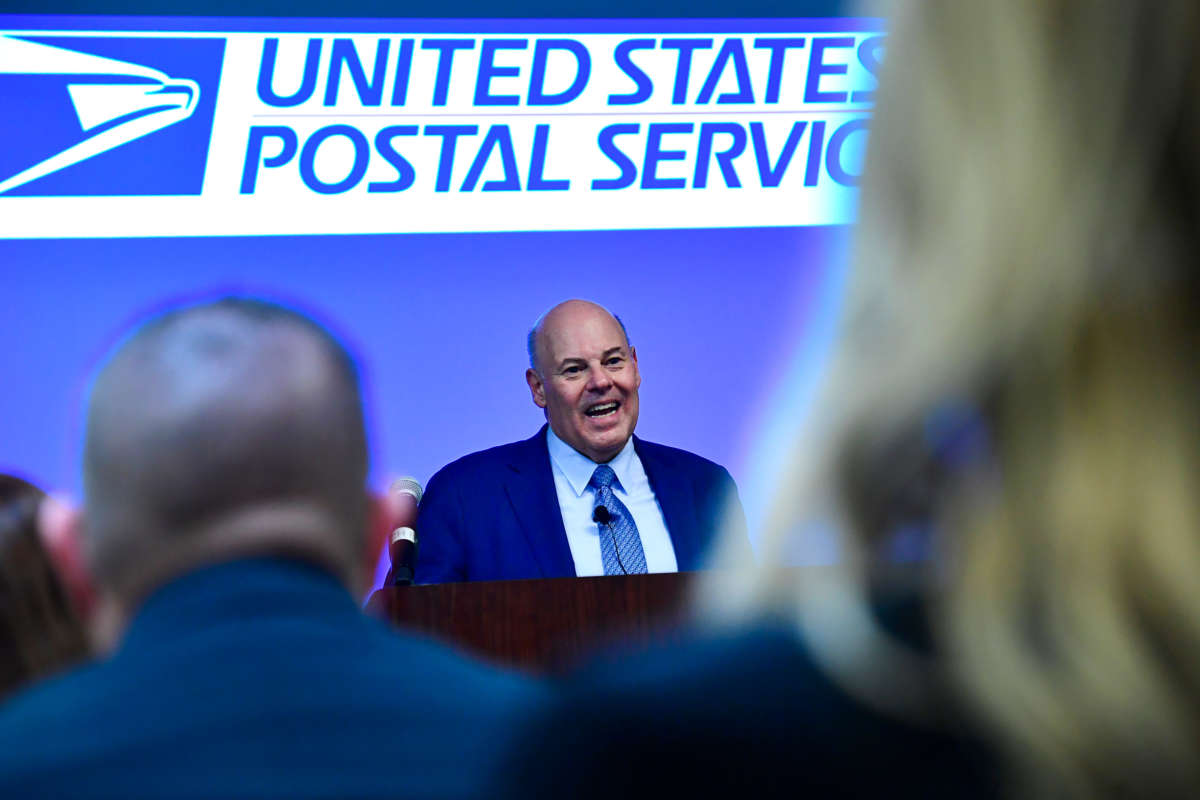Truthout is a vital news source and a living history of political struggle. If you think our work is valuable, support us with a donation of any size.
Postmaster General Louis DeJoy may have broken federal conflict of interest laws by holding investments in a company with federal government contracts for COVID rapid test kits, according to a government watchdog’s analysis of the embattled Trump appointee’s financial disclosures.
The Project on Government Oversight (POGO) found in a report released last week that DeJoy owns roughly between $50,000 and $250,000 of stock in Abbott Laboratories, which produces the popular BinaxNow COVID testing kits. Earlier this year, federal officials awarded Abbott a $306 million contract for test kits as part of the government’s plan to send households free tests through the United States Postal Service (USPS). Abbott also recently won a contract modification for over $1 billion for test kits.
Further, DeJoy had made two transactions involving Abbott between January 7, when the USPS was announced as the shipping partner on the government’s plan, and January 13, when the government announced that Abbott would help provide tests for the program. The two transactions, one valued at between $1,001 and $15,000 and the other valued between $15,001 and $50,000, were made under an agreement about the value of the transactions, according to the filing.
Shortly after those announcements, DeJoy also touted the plan, which was a major win for the Postal Service. “The 650,000 women and men of the United States Postal Service are ready to deliver and proud to play a critical role in supporting the health needs of the American public,” DeJoy said in January. “We have been working closely with the administration and are well prepared to accept and deliver test kits on the first day the program launches.”
POGO says that DeJoy’s stock holdings could be in violation of conflict of interest laws, which bars government officials from reaping personal financial benefits from government projects that they’re involved or participating in.
Even if DeJoy doesn’t ultimately profit from his stock holdings, they could still be illegal, POGO writes. “[T]he law is intended to avoid even the risk that personal finances will influence the performance of official duties,” the report explained. “DeJoy’s stock ownership can trigger the ban on participating in any aspect of the project, whether that’s assisting with logistics or public relations.”
Though it’s unclear if DeJoy was involved in negotiating the contract with Abbott, he still oversaw a major part of the program as the head of the Postal Service. His promotion of the project would also qualify as more direct participation.
“The public shouldn’t have to second-guess whether DeJoy is more concerned with his stock portfolio than ensuring Americans get their mail, packages, prescriptions, and COVID-19 tests on time,” POGO wrote, urging Congress and federal officials to investigate DeJoy’s Abbott stock holdings.
DeJoy’s financial disclosures show that he’s a very active stock trader. In just six months in 2020, DeJoy reported 861 transactions.
He has come under fire for potential conflicts of interest before. According to financial disclosures from last year, DeJoy has a stake in shipping company XPO Logistics worth between $25 million and $50 million. XPO, which DeJoy formerly led as CEO, often works with the USPS to aid in busy shipping times. Overall, he has racked up over a dozen potential conflicts of interest.
Lawmakers have previously said that DeJoy’s conflicts of interest should have disqualified him for consideration for the role, but only the USPS Board of Governors has the ability to remove him. Though President Joe Biden has nominated new board members – enough to form a majority of Democratic board members who could vote DeJoy out – their nominations are stuck in the Senate.
A terrifying moment. We appeal for your support.
In the last weeks, we have witnessed an authoritarian assault on communities in Minnesota and across the nation.
The need for truthful, grassroots reporting is urgent at this cataclysmic historical moment. Yet, Trump-aligned billionaires and other allies have taken over many legacy media outlets — the culmination of a decades-long campaign to place control of the narrative into the hands of the political right.
We refuse to let Trump’s blatant propaganda machine go unchecked. Untethered to corporate ownership or advertisers, Truthout remains fearless in our reporting and our determination to use journalism as a tool for justice.
But we need your help just to fund our basic expenses. Over 80 percent of Truthout’s funding comes from small individual donations from our community of readers, and over a third of our total budget is supported by recurring monthly donors.
Truthout has launched a fundraiser to add 500 new monthly donors in the next 9 days. Whether you can make a small monthly donation or a larger one-time gift, Truthout only works with your support.
